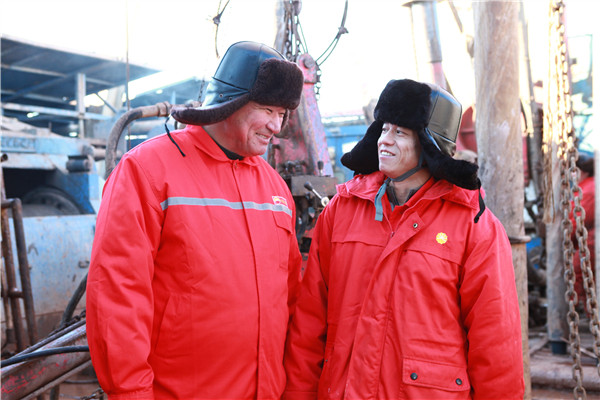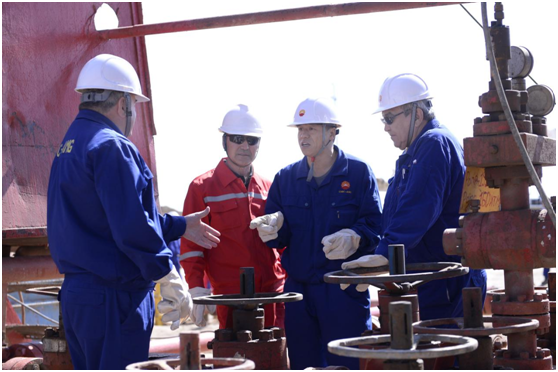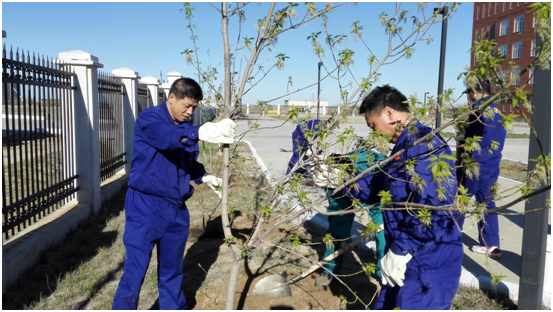It is the 15th year of Wang Yanfeng’s work in the PetroChina’s Aktobe project in Kazakhstan. Wang, the deputy chief engineer and head of field operations, is respected by the Kazakhstan workers for his professional skills, strict management and mild manner. He is honored as “a Bolshevik of the oilfield” by his Kazakhstan colleagues.

Wang Yanfeng (R) and a Kazakhstan colleague [Photo/sasac.gov.cn]
The Aktobe project was PetroChina’s first oil and gas cooperation project in Central Asia and its development is a prime example of China's oil and gas cooperation in Kazakhstan.
Wang obtained a master’s degree at Russian State Gunkin Oil and Gas University at the age of 30 in 2003.
He was assigned to work on the Aktobe project in 2007, as he had abundant oilfield work experience and an overseas educational background; and in particular he has a good command of the Russian language.
As soon as he arrived at the oilfield, Wang found that the Aktobe company was on the verge of bankruptcy due to chaotic management. Without hesitation, he worked with his Chinese and Kazakhstan colleagues to make rules and regulations on production and management, and organized acceptance checks for new drilling operations, ensuring the safety of both the project and workers.
The incidence rate has been reduced to less than 5 percent from 14.2 percent since 2010.
Wang attached a great deal of importance to quality control and the implementation of operating instructions and procedures after he was promoted to the manager of his department.
In addition to management, he has invested significant time in technological research.
The research on the technologies for the sub-salt reservoir in the Kenjiyak oil field is on the top of his list.
With a reserve of more than 100 million tons, the sub-salt reservoir is said to produce 2 million tons of oil every year. It was a “gift” presented to PetroChina by the Kazakhstan side at a negotiation.
However, the oil was hidden 4,000 meters under the earth; the obstacles include a salt bed as deep as 3,000 meters. The high risk of blowout made its exploration a mission impossible. It required cutting edge technologies and careful planning.
A group of domestic experts with various academic backgrounds were invited to work on the technological research starting from 2000, and Wang played an active role in promoting their technical achievement.

Wang (2nd, R) give technical instructions to his colleagues at a construction site. [Photo/sasac.gov.cn]
Through the joint efforts of technical experts and Wang’s team, the drilling projects in the Kenjiyak oil field are progressing with high efficiency and at low cost.
In addition to diligence and a strong sense of responsibility, being calm and cool-headed in emergencies is another of Wang’s merits.
A “kick” or incident occurred in a well in the Kenjiyak oil field late at night on Jan 21, 2012, when most of Wang’s Chinese colleagues had returned to China for Spring Festival. Oil and gas sprayed instantaneously under high pressure.
Wang immediately summoned the technicians and analyzed the possible cause. They worked out an emergency plan and prepared heavy mud to kill the well. Due to the shortage of manpower, Wang and his colleagues stayed at the site for days and nights to monitor the progress of kick control.
Thanks to their hard work, the well was restored to production on Jan 24.
As a Party member, Wang said it’s his obligation to subordinate himself to scheduling of production.
The oil field was woefully understaffed during 2008 and 2009 when many Chinese workers were detained in China due to visa issues. In order to keep the project going, Wang painstakingly made staff arrangements. All the 39 drilling rigs and 16 work-over rigs functioned well during the five months in question.

Wang (L) plants a tree with colleagues in his spare time. [Photo/sasac.gov.cn]
(Executive editor: Hao Wen)